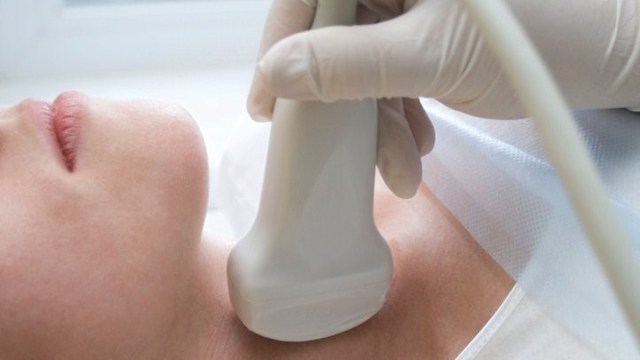 WavebreakMediaMicro/Fotolia
WavebreakMediaMicro/Fotolia
Are you a woman in your forties who is feeling irritated, with no energy, and with changeable periods in the last several months?
When you look at those symptoms, do you automatically assume that you are going into menopause? It would make sense because menopause is the transition from menstruating to the cessation of menstruation.
Perhaps it's menopause, but you could also be having a thyroid problem that you are unaware of instead. The symptoms for the two diseases are similar.
Let’s take a look.
Here some very common symptoms that are part of the menopause transition:
• Fatigue or loss of energy
• Irregular periods
• Sleeplessness or insomnia
• Unexplained weight gain
• Forgetfulness or fuzzy thinking
• Mood changes or irritability
• Hair thinning or hair loss
• Loss of sexual appetite or low libido
• Vaginal dryness
• Food cravings
• Digestive problems including constipation
• Anxiety or a feeling of overwhelm
• Decreased memory
• Depression symptoms
During the perimenopausal and menopausal process, women may experience more than half of the symptoms listed above.
If you have more than five of these symptoms, you may be experiencing hormonal imbalance. What's surprising is that the hormonal imbalance could also be a low thyroid or hypothyroid condition.
Here are the symptoms of low thyroid or hypothyroid problems:
• Feeling constantly tired
• Fatigued or weak
• Not able to tolerate cold weather or feel cold inside
• Memory or concentration problems
• Constipation
• Heavy bleeding or long menstrual periods
• Pale or dry skin or thinning hair
The thyroid gland is responsible for growth of bone, skin, hair and nails. It regulates metabolism, muscle function, respiratory rates, heart rates, as well as our moods.
According to holistic medicine practitioner Dr. Raphael Kellman, “Low thyroid function leads to decreased levels of progesterone. This will have the same result creating an imbalance in hormones with higher levels of estrogen. Besides producing uncomfortable, even debilitating symptoms, excess estrogen is toxic and may lead to more serious conditions like migraines, fibroids, ovarian cysts, breast, uterine and ovarian cancer.”
So if you are having a combination of these symptoms, how do you determine whether the real problem is menopause or hypothyriodism?
Don’t fear, you don’t have to figure it out on your own.
The first thing to do is to make an appointment with your physician and discuss your symptoms. While you are there, get some blood work done to help identify the problem.
One of the best benefits of working with a licensed naturopathic doctor or a functional medicine medical doctor is that they will understand which additional lab tests to add to correctly identify the problem.
When I work with patients, I do blood testing that includes a thyroid panel which includes these tests: TSH, free and total T3, free and total T4, and thyroid peroxidase.
Looking at the combination of tests makes it easy to identify thyroid problems. Many conventional doctors will only look at TSH levels and they may miss thyroid malfunction.
If the thyroid tests come back normal and I suspect female hormones are causing the symptoms, I recommend specialized laboratory testing to look at estrogens, progesterones, testerone, DHEA and cortisol levels. Looking at this combination gives more than enough information to determine whether the female hormones are creating the symptoms.
I have found that listening to a patient's symptoms, as well as using specialized lab testing, is the best way to identify the underlying cause and treat it correctly.
It is such a relief when you stop feeling bad and start feeling good after you have the right diagnosis and treatment plan.
You can’t do this alone. You must get the right help!
Live Vibrantly,
Dr. Dae
Dr. Daemon Jones
Dr. Dae's website: www.HealthyDaes.com
Dr. Dae's Bio:
Dr. Daemon Jones is your diabetes reversal, hormones, metabolism and weight loss expert. Dr. Dae is a naturopathic doctor who treats patients all over the country using Skype and phone appointments. Visit her or schedule a free consultation at her website www.HealthyDaes.com
Sources:
"Hypothyroidism: Symptoms - MayoClinic.com." Mayo Clinic. N.p., n.d. Web. 14 Jan. 2016.
http://www.mayoclinic.org/diseases-conditions/hypothyroidism/symptoms-causes/dxc-20155382
"Medical Causes of Menopause: Surgical Menopause and More." WebMD. WebMD, n.d. Web. 13 Jan. 2016.
http://www.webmd.com/menopause/guide/medical-procedures-menopause
"Menopause." Symptoms. N.p., n.d. Web. 13 Jan. 2016.
http://www.mayoclinic.org/diseases-conditions/menopause/basics/symptoms/con-20019726
"Menopause Hot Flashes Symptoms, Causes, and Treatments." WebMD. WebMD, n.d. Web. 13 Jan. 2016.
http://www.webmd.com/menopause/guide/menopause-hot-flashes
Menopause or Low Thyroid -- Is it One, the Other or Both? Huffingtonpost.com 13 Jan. 2016.
http://www.huffingtonpost.com/dr-raphael-kellman/menopause-or-low-thyroid-_1_b_8406544.html
Reviewed January 14, 2016
by Michele Blacksberg RN
Edited by Jody Smith





